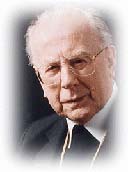|

|
Cardinal Franz König:
1905-2004, Franz Koenig, PhD, born 1905; ordination; 1938-1945 youth
minister; 1949 professor of moral theology in Salzburg; 1952-1956 Bishop
Coadjutor in St. Poelten; 1956-1985 Archbishop of Vienna, from 1958
Cardinal; as member of two commissions Cardinal Koenig made essential
contributions to the Second Vatican Council (1962-1965). 1964 foundation
of the ecclesial fund "Pro Oriente" which enabled great progress in the
cooperation with the churches of Eastern Europe and Asia. 1965-1980 he was
president of the Vatican Secretariat for Non-Believers, and 1985-1990
president of Pax Christi International. As emeritus Cardinal Koenig is
again active in ministry.
-
Influence
of Zarathushtra in the World
The press announcement regarding his death is attached
below.
Austria's
Cardinal Franz Koenig; Helped Form Vatican Policy
By William J. Kole
Associated Press
Sunday, March 14,
2004; Page C10
VIENNA -- Cardinal
Franz Koenig, Austria's highest moral authority and a former
trendsetter for the
Vatican's policy toward other religions and postwar
communist regimes,
died March 13. He was 98.
The famed Pummerin
bell in Vienna's downtown St. Stephen's Cathedral rang
solemnly in honor of
the Vienna archbishop, who was widely revered in
overwhelmingly Roman
Catholic Austria even after his retirement in 1985.
He died in his sleep
in Vienna, Austrian radio reported. No cause of death was
given.
Cardinal Koenig is
known to have facilitated the nomination of Polish-born
Cardinal Karol Wojtyla,
who would become Pope John Paul II. He recalled that at
the time, Poland's top
churchmen voiced misgivings that the pontiff-to-be was
"too young and too
little-known."
Cardinal Koenig was
Vienna's archbishop from 1956 until 1958, when Pope John
XXIII elevated him to
cardinal. He was president of the papal Secretariat for
Non-Believers from
1966 to 1981 and played a key role in preparations for the
1962-65 Second Vatican
Council.
No other churchman
enjoyed greater prestige or managed to penetrate Austria's
cultural elite and
public life. A renowned church scholar, the multilingual
cardinal felt as much
at ease among foreign dignitaries, actors and scientists
as he did with young
people and trade union functionaries.
Born in the lower
Austria village of Rabenstein, the future cardinal studied at
the Gregoriana papal
university in Rome and later at its Bible Institute, where
he specialized in old
Persian languages and religion.
He received a
doctorate in philosophy in 1930 and another in theology in 1936,
three years after
being ordained a priest.
After years as a
chaplain and teacher during World War II, Cardinal Koenig
became a professor in
Krems, Austria, in 1945 and a university professor in
Salzburg, Austria, in
1948. His many publications included the three-volume
"Christ and the
Earth's Religions."
In a move considered
bold at the time, he participated in a conference in Bombay
with representatives
of three non-Christian religions in 1964.
In 1960, Cardinal
Koenig was surprisingly granted a visa by Yugoslavia's
communist authorities
to attend the funeral in Zagreb of Croatian Cardinal
Alojze Stepinac.
Cardinal Koenig's car was involved in a serious car accident enroute to
the funeral, and he recalled awaking in a hospital decorated with a
huge portrait of
Yugoslav dictator Josip Broz Tito.
By staring for days at
Tito's portrait, Cardinal Koenig said, he conceived the
idea that the
archbishop of Vienna should do more for the churches behind the
former Iron Curtain.
Dispatched by Pope
John XXIII, Cardinal Koenig in 1963 became the first Catholic
prelate to visit
Hungarian Cardinal Jozsef Mindszenty, and subsequent visits
ultimately led to
Mindszenty's departure to the West.
After that
unprecedented journey, Cardinal Koenig also visited Poland and
Romania and later the
Orthodox Church of Serbia. |